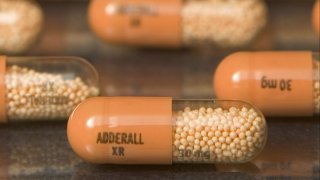
A nationwide shortage of Adderall is making it harder for some parents to help their children manage the symptoms of attention-deficit/hyperactivity disorder (ADHD).
Kandi and Lion Fludd had no reason to believe they'd have issues filling their 8-year-old son's Adderall prescription when running errands in their hometown of Las Vegas, Nevada two weeks ago. "We had no notice," Kandi, 44, told TODAY Parents. "When we went to the pharmacy, they told us it was nationwide, they didn't know when they'd get (another shipment) and that we needed to call our doctor's office."
Kandi says it was difficult to connect with her son's doctor, due in large part to an influx of calls from other parents who could no longer fill their children's prescriptions.
"I spoke to one nurse and she said she had three other calls before me with parents crying because there was no Adderall at the pharmacy and they didn't know what to do," Kandi added.
Get top local stories in San Diego delivered to you every morning. Sign up for NBC San Diego's News Headlines newsletter.
The couple's son went seven days without his medication before a pharmacist could fill his prescription.
"I was calling the pharmacy every day. After four days, his teacher walked out to my vehicle when I was picking him up from school and said, 'I can't deal with it anymore — you have to do something,'" Lion, 45, explained.
"She said he was rolling on the ground, wasn't focused and getting in other kids' faces," Kandi added. "When he's not on medication ... there are no boundaries."
U.S. & World
"Not having access to this medication for our son affects our lives tremendously," Lion said.
What is causing the nationwide Adderall shortage?
Dr. Max Wiznitzer, a pediatric neurologist and co-chair of the Professional Advisory Board for CHADD, an ADHD advocacy organization, says Adderall shortages are not uncommon.
"The raw materials for stimulant medication are government regulated and supervised," Wiznitzer told TODAY Parents. "Drug companies have to request certain quantities of the raw materials every year and it has to be approved by the DEA. We've had other years in the past where, as we get towards this time of year — the end of October, November, December — companies don't have the raw material anymore and can't provide the product."
On Wednesday, Oct. 12, the Federal Drug Administration (FDA) confirmed the nationwide shortage the of immediate-release form of Adderall, a stimulant medication that can assist people in managing ADHD symptoms, including anger, anxiety, forgetfulness and trouble focusing.
The FDA is citing "ongoing intermittent manufacturing delays" and a lack of "sufficient supply to continue to meet U.S. market demand through those producers" as the cause of this year's shortage.
In August, Teva Pharmaceuticals — the country's largest Adderall manufacturer — reported order delays, citing a labor shortage. On August 5, nearly 64% of 360 independent pharmacies had issues acquiring Adderall, according to one survey conducted by the National Community Pharmacists Association.
The Adderall shortage could last until January 2023, according to the FDA website.
Wiznitzer says a better understanding of ADHD means more Adderall prescriptions, which can also lead to supply shortages.
"We now recognize that ADHD doesn't stop when you're 16 years old," Wiznitzer said. "We're better at recognizing the presence of ADHD in adults and therefore treatment is being instituted, and stimulant medications are still one of the main treatments."
ADHD diagnoses among children and adults have also surged during the ongoing COVID-19 pandemic, according to a survey of 2,365 adults conducted by ADDitude, a quarterly consumer publication about ADHD.
"More kids were having difficulty sustaining attention and concentration, especially during remote school," Dr. Brittany Webber, a child and adolescent psychologist practicing in New York, told TODAY. "It's becoming an increased presentation that we're seeing — a fair combination of anxiety and ADHD and often the two are linked."
As ADHD diagnoses and prescriptions for Adderall have increased, the DEA has decreased the quota amount allowed for the raw materials used to manufacture the drug, citing cases of recreational use and abuse.
What parents need to know
Wiznitzer stressed that supply issues are not new for doctors, pharmacists or clinicians.
"This is more of a hiccup than a 'the sky is falling' scenario," he said. "My big piece of advice is to work with the prescribing medical professional to make sure you can access a treatment that works best for you or your child's ADHD."
Wiznitzer added that while certain prescription dosages may be unavailable, others are in stock and, in concert with a physician, parents could obtain a different dosage of the same medication in order to work around the issue.
Webber agreed, adding that there are plenty of other medication options, prescription dosages and alternative treatments parents can explore. She noted that not every alternative will be appropriate or successful.
"Not every medication is right for every child," Webber said. "Sometimes parents have to try a couple different things until they find something that both works and has minimal side effects for the child. So yes, there are other medications but are they an exact match for Adderall? No."
Parents could also run into health insurance issues even if they're able to switch manufacturers or medications.
"If it's a brand name medication, you have to play 'prior authorization games' with the insurance company," Wiznitzer explained.
For parents Kandi and Lion, insurance issues were a problem.
"It took us a long time to even get referrals from the insurance," Kandi explained. "The insurance can only go to certain places and those places need so many documents and forms and they only can see certain patients with certain insurances and then it costs out of pocket ... a lot of parents are lost and don't know where to go to even get help."
The role of ADHD medication shame and stigma
In response to the shortage, some people on social media have criticized parents for giving their children Adderall at all.
One 2008 study found that "stigmatizing conceptions about stimulant medication" can "adversely affect" patients seeking pharmaceutical options, and parents are "less likely to turn to close relatives, friends, community hospitals and psychiatrists than to teachers, medical doctors and mental health professionals" when their child is diagnosed with ADHD.
"We'd never say the same thing to someone with diabetes who needed insulin, because their body can't produce it on their own," Webber said. "This is similar — their child's body is not producing the neurotransmitters necessary for them to be able to maintain control over their bodies."
Webber added that parents are "damned if they do and damned if they don't."
"They either face the stigma of having a child that another person considers out of control, or the stigma of giving their child something that could be used as a tool for learning to self-regulate," she said.
Kandi and Lion said that in the midst of some people's judgment, they remain focused on their son and his wellbeing. Fearing additional supply issues in the future, the child's doctor offered to prescribe a different medication. The couple hasn't agreed to the switch yet, because they're worried about how it will impact their son physically and emotionally.
"Adderall is an absolute necessity at the moment," Lion said. "We jokingly say we'd sell our home before we'd go without giving him medication. Without it he says his 'brain shakes.'"
To shield their child from any shame, the parents have taught that ADHD is their son's "super power."
"We don't want him ashamed," Lion explained. "It's not his fault. It's just what it is and we need to learn to work with it and shine with it."
This story first appeared on TODAY.com. More from TODAY:



